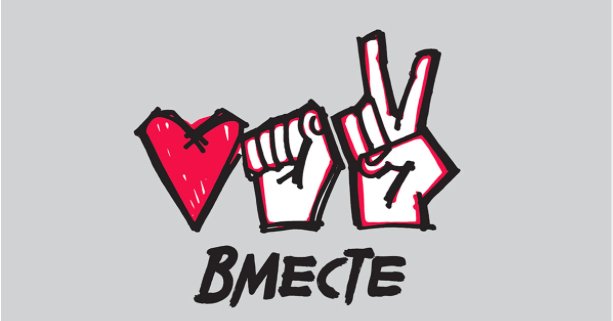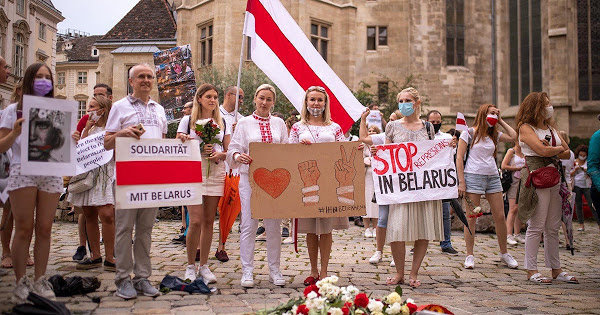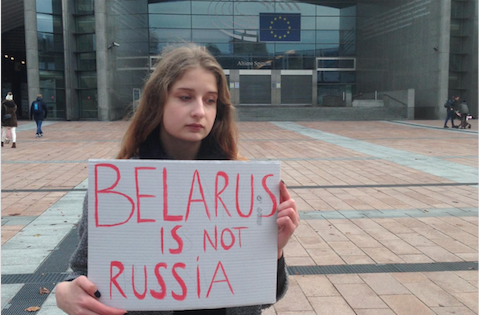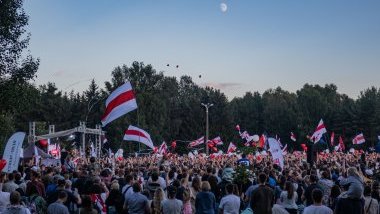“This is my land and I will not run,” he stated emphatically on August 7th, in an wide-ranging 2-hour interview with Ukrainian journalist Dmitry Gordon. “I will not run. And people need to know that I will not run.” In the same interview, Lukashenka dismissed several of his former opponents in the 2020 presidential race, the ex-banker Viktar Barbaryka, and former diplomat and IT maven Valery Tsepkalo. Mentioning the Russian ownership of Belgazprombank, where Babaryka once served as a board member, he insinuated that the two men were fully sponsored by Russia.
As the ruler of “Europe’s last dictatorship”, Lukashenka is not a man who typically needs to run away. Elections in Belarus are usually a straightforward matter, their winner predetermined. But 2020 seems to have brought with it a breath of fresh air : Babaryka, Tsepkalo, and the blogger Siarhei Tsikhanouski were all tremendously popular as prospective election candidates. And when they too fell to the regime’s machinations in late July, the candidate who replaced them, Siarhei’s wife Sviatlana Tsikhanouskaya, went on to garner unprecedented levels of support. Her rallies drew tens of thousands of people, even as Lukashenka’s own position weakened further.
Events on the ground in Belarus tell a very different story than that which is recounted by its President in TV interviews. The regime’s opposition has not been cultivated abroad – it is deeply rooted in Belarusian soil. And although it is still too soon for anything to be certain, it may yet succeed in wresting power from Lukashenka’s grasp.
An election season unlike others
Last Friday, Belarus’s Central Election Commission (CEC) formally announced Lukashenka as the victor of the 2020 presidential election. Lukashenka was said to have received 80% of the vote, with Tsikhanouskaya reportedly only receiving 10%. These claims are not credible. As in previous years, this year’s election was thoroughly rigged, and numerous foreign observers across the Western world have already begun to call for new elections. In the past, Lukashenka has openly admitted to falsifying the results of elections, and there is extensive evidence in this instance that the true election results are wildly at odds with those claimed by the CEC.
During this election cycle, Lukashenka also faced his greatest challenge in many years. In response, he reshuffled his government in June and unleashed a harsh wave of repression. Raids were conducted, leading candidates were disqualified, and thousands of people were arrested. When opposition rallies began to swell with support, Lukashenka banned protests. Throughout this time, Lukashenka tried ceaselessly to strengthen his relations with his security forces.
Lukashenka’s “main ‘electorate’ was always men in uniform – and they vote not with ballots but with hoses,” Volha Biziukova, a PhD candidate at the University of Vienna, informed me in a written interview. Conversely, the opposition quickly built “a broad-based coalition – a movement for, of, and by all kinds of people.” Right from the start, she added, “citizens started queuing in long lines for hours to give their signatures to nominate candidates,” and “it became apparent that very different people from very different walks of life were unexpectedly becoming mobilized.”
READ : « This Is a War of Terror by the State Against the People »
When asked about what motivated voters to band together in this way, Biziukova cited manifold reasons. Lukashenka’s atrocious handling of the coronavirus pandemic was one factor. But, she continued, “economic stagnation”, the “obsolescence” of the country’s social model, and a “lack of any vision of future development” were crucial as well.
When official exit polls showed roughly 80% of the votes going to Lukashenka on Sunday, Belarusians began to fill the streets of Minsk and other cities in protest. The government quickly dispatched troops and riot police to contain the protests, leading to a night of bloody clashes in which hundreds of people were injured and thousands more were imprisoned. Things have only escalated since then : in the week since the election, protests have spread throughout all of Belarus, with many other solidarity demonstrations being held in neighboring countries such as Poland and Russia. International condemnation led to a release of detainees and prisoners, all of whom attested to extensive human rights abuses. The sheer viciousness of the regime’s response to the protests has in turn caused them to grow even larger.
Tsikhanouskaya also issued a sharply worded condemnation of the repression, but mysteriously disappeared the day after the election, only to reappear in Lithuania. She released a video statement claiming that she had “made this decision absolutely independently.” But many people knew better. “We can see that Lukashenka is afraid of Sviatlana, and that he knows that he lost this election,” claimed Darya Shkarupina, a Belarusian student at the Vrije Universiteit Brussels, in another written interview. “Otherwise, why would she have been forced to flee the country ?”
On Friday, August 14th, Tsikhanouskaya called for a renewed wave of protest. But she needn’t have asked. The opposition took Tsikhanouskaya’s departure in stride, and the protests have become larger and larger with each passing day. If Lukashenka had intended to achieve a kind of social decapitation by forcing Tsikhanouskaya into exile, he failed. Ironically, the biggest threat to Belarus’s Great Leader now appears to be a leaderless movement which extends even into the rural areas from which Lukashenka has traditionally drawn the most support.
Indeed, my interviews with these Volha Biziukova and Darya Shkarupina painted a picture of a society in which Lukashenka has himself become obsolescent. Lukashenka seems incapable of “believ[ing] that people are fed up with him and don’t want him anymore”, said Shkarupina. For that reason alone, she stressed, he’s unqualified for his office. “Personally, I see Lukashenka as a person who cannot analyze and adequately interpret some things anymore.”
READ : « In These Protests You Can See the Rebirth of a Nation »
As the past week has shown, Lukashenka’s brutality and paranoia remain extremely potent forces. Yet the environment they have helped create has so far proven quite inimical to his goal of holding onto power. With such widespread violence, writes Vadim Mojeiko in Belarus Digest, Lukashenka has actually done a great deal to undermine himself. Far from ending the contestation of his regime, he has in fact galvanized it.
A future worth hoping for
Both Biziukova and Shkarupina see the same next steps : protestors, and Belarusians more generally, must secure a transfer of power, start a process of transition, and build a clean slate for Belarus as a democratic European country.
Last Friday, after the CEC announced the official results of the election, Tsikhanouskaya issued another video message calling for an end to the violence and a beginning to negotiations with the regime. She also announced the creation of a “Coordination Council” that would help facilitate a government handover.
But the place of Tsikhanouskaya in all this is more uncertain. “We want Sviatlana to get in the office,” Shkarupina affirmed. “People voted for her, so this is the most reasonable thing to do.” But, as Biziukova pointed out, Tsikhanouskaya only ever thought of herself as a symbol, not a leader. “Tsikhanouskaya wanted to “become a ‘technical’ president only to ensure a transition and new elections”, she said. “According to the plan, she would have been president for half a year.”
New elections might follow. What will come after that is anyone’s guess – but in the meantime, both women have their aspirations firmly set on the upcoming days and weeks. “This broad movement of solidarity is our major hope,” Biziukova told me.




Suivre les commentaires : |
|
